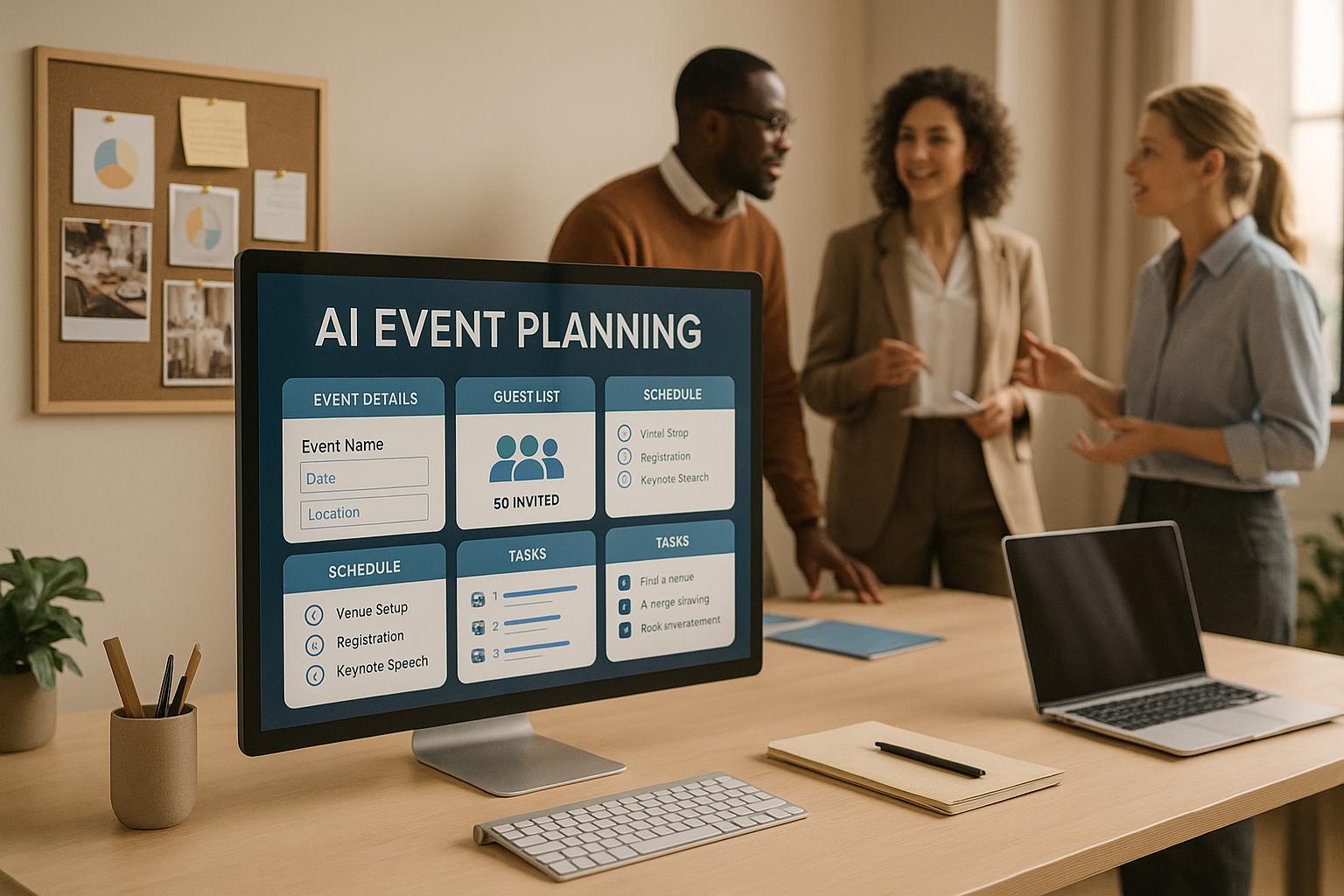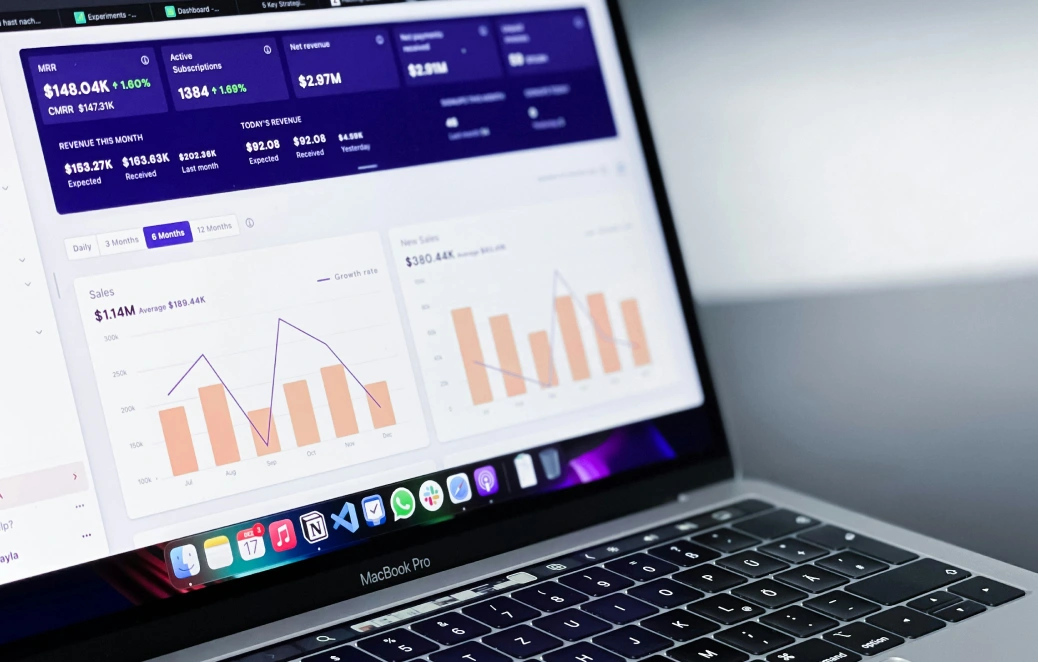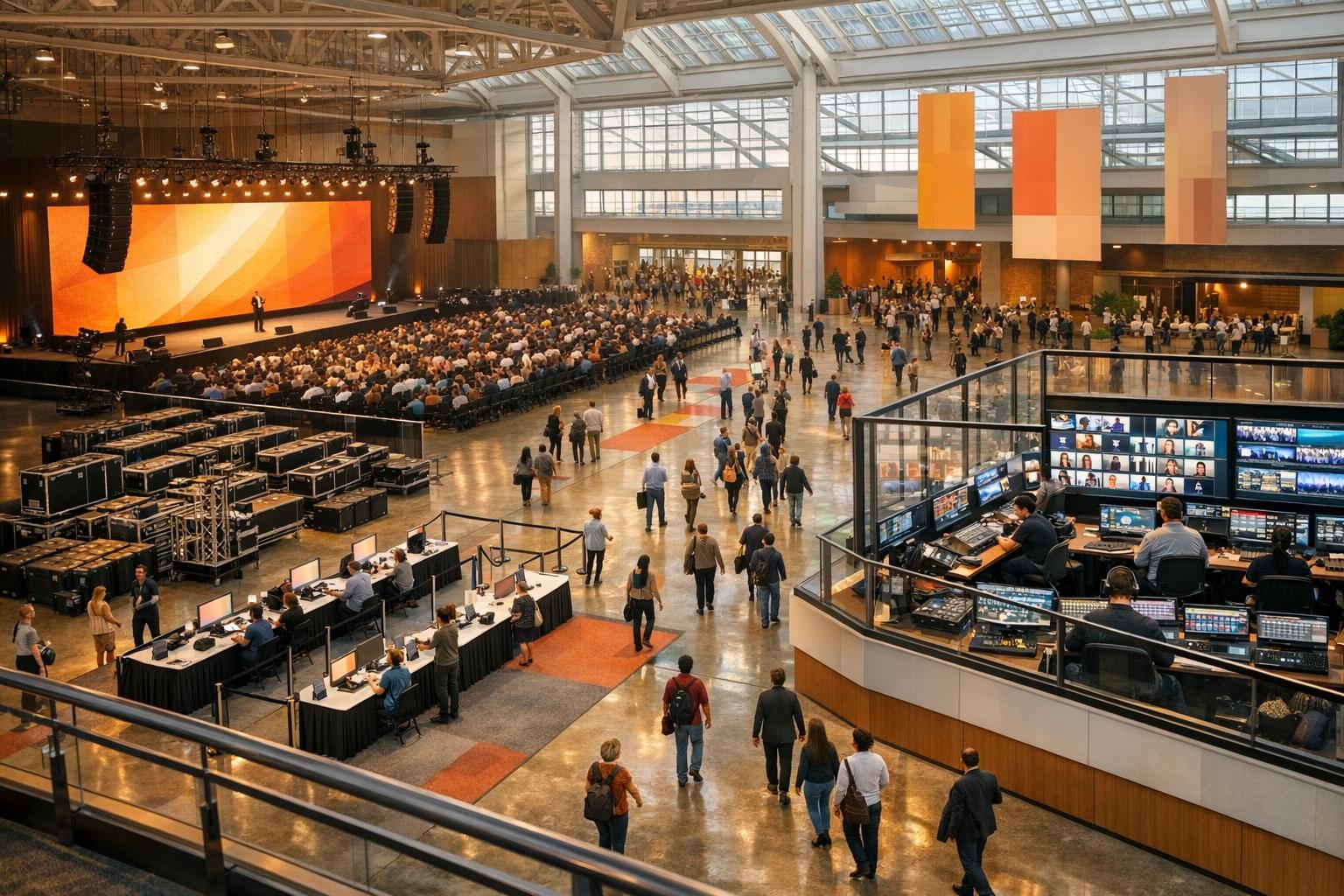Innovative AI Tools Used in Corporate Event Planning

Chief Executive Officer

AI is transforming corporate event planning in the U.S., making it faster, more efficient, and data-driven. From automating repetitive tasks like registration and vendor management to delivering personalized attendee experiences, AI tools are reshaping how events are organized and executed. Key benefits include:
- Automation of tasks: Registration, scheduling, and vendor coordination are now streamlined.
- Personalization: Tailored agendas and networking recommendations enhance attendee satisfaction.
- Real-time adaptability: AI manages last-minute changes and ensures smooth communication.
- Post-event insights: Advanced analytics track ROI, engagement, and financial outcomes.
Companies like Corporate Optics integrate AI to simplify event management while addressing U.S.-specific requirements like time zones, tax calculations, and compliance with privacy laws. By combining AI with human expertise, planners can focus on creativity and strategy, ensuring events are impactful and well-organized.
The future of corporate events lies in leveraging AI to save time, cut costs, and improve results.
Get smart - AI tools essential for planning events
Corporate Optics: AI-Driven Event Production Solutions

Corporate Optics combines decades of expertise in technical event production with cutting-edge AI tools to transform corporate event experiences. By partnering with leading AI innovators, the company integrates advanced technology into every stage of event planning, execution, and analysis. These tailored solutions offer a closer look at how AI is reshaping event production through Corporate Optics' approach.
AI-Powered Features for Event Production
Corporate Optics uses AI to simplify and enhance various aspects of event production. From scheduling and resource coordination to speaker support and live streaming, these tools help streamline the entire process. After the event, detailed analytics provide insights to improve future planning. This approach addresses many of the challenges event planners face today, helping to save time and improve outcomes.
How AI Solves Common Event Planning Problems
Corporate Optics' AI-driven solutions tackle the most frequent pain points of event planning. Automated features handle tasks like registration, vendor communication, and attendee management, freeing up valuable time for planners. Real-time analytics enable quick adjustments during events, while integrated budgeting tools ensure financial accuracy and control. By automating these processes, Corporate Optics transforms the traditional workflows of event planning, making them more efficient and less stressful.
US-Specific Solutions for Corporate Events
Corporate Optics designs its tools specifically for the US corporate market. Financial tracking is formatted in US dollars ($) and includes automatic tax calculations based on state and local regulations. Scheduling tools are tailored to US time zones (Eastern, Central, Mountain, Pacific) and follow the MM/DD/YYYY date format. The system also accounts for imperial measurements (feet, inches, Fahrenheit) and aligns with US business calendars, avoiding conflicts with federal holidays and major industry events. These features ensure seamless integration into the unique demands of US-based corporate events.
AI Tools for Event Management
AI tools are transforming event planning by taking over repetitive tasks like registration, scheduling, and vendor coordination. These platforms act as a central hub, eliminating the chaos of managing multiple spreadsheets and communication apps. By streamlining processes, they simplify planning and help event organizers focus on the bigger picture. Corporate Optics, known for its advanced AI production solutions, incorporates these tools to refine the event management experience further.
Automating Registration, Scheduling, and Vendor Management
AI-powered registration systems handle sign-ups, manage waitlists, and send timely reminders to attendees. Scheduling tools go a step further by balancing speaker availability, room capacities, and technical needs to ensure events run without a hitch. If conflicts arise, the system suggests alternative arrangements and even assists in rescheduling sessions seamlessly.
Vendor management also gets a boost with automation. These tools monitor vendor performance, track budgets, and store useful data for future events. By handling these key tasks, AI platforms work hand-in-hand with Corporate Optics’ event solutions, ensuring attendees and vendors receive timely updates about logistics and changes.
Connecting AI Tools with AV Production and Reporting
When AI event management platforms integrate with audiovisual (AV) production, the result is a smoother, more cohesive planning process. Some systems can translate event specifications into detailed AV requirements, providing clear guidelines for technical teams. Real-time updates keep AV crews informed about changes, like session format adjustments or room layout tweaks, reducing miscommunication and minimizing technical hiccups.
Corporate Optics takes full advantage of such integrations through its collaboration with prompts.ai, an AI platform designed to enhance corporate meeting and event production. This partnership ensures that AV specifications align perfectly with event goals, bridging the gap between logistics and technical execution. Additionally, integrated post-event reporting offers insights into audience engagement and technical performance, helping planners make better decisions for future events. These solutions highlight the importance of choosing the right platform for different event needs.
AI Event Management Platform Comparison
Not all AI platforms are created equal, and they cater to varying corporate event requirements. For large, multi-day events, enterprise-level platforms offer advanced analytics and seamless workflow integrations. On the other hand, mid-market and niche tools focus on flexibility and core functionalities tailored to specific event types. Key factors to consider when selecting a platform include event frequency, audience size, and operational demands.
Corporate Optics provides tailored services to meet these diverse needs, offering solutions that enhance efficiency and deliver top-notch event production. Whether you’re managing a small gathering or a large-scale conference, these tools can help you plan smarter and execute flawlessly.
AI for Audience Engagement and Communication
AI is changing the game for corporate events by making experiences more interactive and tailored to individual needs. It helps break down language barriers, delivers focused messaging, and strengthens connections between speakers and attendees. This shift opens the door to more dynamic and meaningful audience interactions.
Real-Time Audience Engagement Tools
AI-powered platforms bring live polling, structured Q&A sessions, and chatbot support to events, allowing organizers to gather real-time feedback. This feedback enables speakers to adjust their presentations on the fly, keeping the audience engaged and actively participating. The result? A more energetic and involved crowd throughout the event.
AI Translation and Accessibility Features
Translation and transcription tools powered by AI are making events more inclusive. Real-time captioning and transcription services help non-native speakers and those with hearing impairments follow along seamlessly. Features like visual description services add another layer of accessibility, ensuring everyone can connect with the content. These efforts go beyond inclusivity - they enable tailored communication that resonates with a diverse audience.
Personalized Communication and Marketing Automation
AI-driven platforms take personalization to the next level by customizing invitations, notifications, and follow-ups based on individual preferences. When combined with Corporate Optics' production services, these tools help deliver clear and consistent communication that keeps audiences engaged before, during, and after the event.
sbb-itb-ae35a94
AI Analytics and Post-Event Insights
The real power of AI in corporate event planning shines after the event wraps up. AI analytics platforms take all the raw data collected during the event and turn it into meaningful insights. These tools don’t just stop at attendance numbers - they dig deeper into engagement trends, financial outcomes, and overall event performance. This information helps planners pinpoint what worked, what fell short, and how to refine future events. Ultimately, these insights make it easier to measure ROI and assess attendee engagement.
Measuring Event ROI and Engagement Metrics
AI analytics platforms simplify the often-complex task of calculating return on investment. By analyzing multiple data sources at once, these systems provide a detailed breakdown of how the event performed. They monitor things like attendee behavior, session popularity, networking activity, and lead generation, all of which feed into comprehensive ROI reports.
Engagement is another critical metric these tools track. They measure it by analyzing booth visits, how long attendees stayed in sessions, and how often they interacted with content. Engagement algorithms even assign weight to different attendee actions, helping planners figure out which activities created the most valuable connections and which sessions resonated the most with the audience.
AI also works behind the scenes to track satisfaction scores in real time. By analyzing feedback forms, social media chatter, and post-event surveys, these tools can identify sentiment patterns and flag potential issues before they escalate. When paired with ROI metrics, AI-driven reporting consolidates all this data into clear, actionable insights.
Automated Post-Event Reporting
Gone are the days of spending weeks compiling post-event data. AI-powered systems can generate detailed reports within hours of an event’s conclusion. These reports don’t just summarize what happened - they provide a full picture of key performance indicators in formats that are easy to digest.
For example, AI integrates data from registration systems, mobile apps, social media, and on-site sensors to create unified reports. These reports can break down attendance by department, geographic location, and even seniority level, giving planners a better understanding of their audience. Building on real-time analysis, these tools also offer a comprehensive perspective on any adjustments made during the event.
AI reporting tools are particularly good at spotting trends and comparing current performance to past events. They automatically flag changes in metrics like registration timing, session attendance, or networking activity. Plus, with visual charts and graphs, stakeholders can quickly grasp the insights without wading through raw data.
Another advantage? AI generates customized reports for different audiences. C-suite executives get high-level strategic summaries, marketing teams receive detailed lead generation data, and HR departments see reports focused on employee engagement. Each report is tailored to the recipient’s specific needs, ensuring the right information reaches the right people.
Budget Tracking and Spending Analysis
AI takes budget tracking to the next level by offering a real-time view of event finances. It automatically categorizes expenses and connects seamlessly with corporate credit cards, vendor invoicing systems, and expense management tools. Using predictive modeling, AI can alert planners to potential cost overruns and flag unusual spending patterns, allowing for proactive adjustments.
This financial oversight ties into the operational flexibility AI provides throughout the planning process. For instance, if early spending suggests the budget might be exceeded, AI can project final costs and recommend changes to keep expenses in check. This real-time analysis helps prevent unpleasant surprises and supports more informed decision-making.
AI doesn’t just track spending - it connects it to outcomes. For example, if additional funds are spent on premium technical support, AI can show whether that investment led to higher session satisfaction scores. This kind of data helps planners justify budget decisions and optimize spending for better results, rather than simply cutting costs.
Corporate Optics, for instance, integrates AI analytics into its event production process to provide clients with detailed post-event insights. Their platform tracks elements like AV quality, stage design, and technical execution, linking these factors to business outcomes. This data-driven approach helps clients refine their strategies for future events.
Spending analysis can also extend beyond direct costs. Metrics like cost per engagement, cost per lead, and cost per satisfaction score give planners additional tools to demonstrate value to leadership. These insights help guide smarter investments in future events, ensuring every dollar spent delivers maximum impact.
Best Practices for Using AI in US Corporate Event Planning
To successfully integrate AI into corporate event planning, it’s essential to align these tools with US-specific needs while maintaining the irreplaceable human touch. The most effective planners use AI to complement their expertise, not replace it.
Adapting AI Tools for US Corporate Events
Corporate events in the US come with unique requirements that AI tools must meet. These include adhering to local data privacy laws like the California Consumer Privacy Act (CCPA), using US-specific terminology, and following American standards for measurements, currency, and scheduling.
When choosing AI platforms, prioritize those with robust privacy controls and transparent data practices. Look for tools that can automatically generate privacy notices tailored to US legal standards, offer simple opt-out options for attendees, and maintain detailed records of data usage. Many globally designed AI platforms may lack these features, so it’s important to verify their compliance with US regulations.
Language localization is another critical factor. This goes beyond mere translation - it requires AI tools to understand American business jargon, spelling, and cultural subtleties. For instance, scheduling systems should handle US time zones accurately, use the MM/DD/YYYY date format, and include terms like "elevator" instead of "lift" or "restroom" instead of "toilet" in automated messages.
A great example of this is Corporate Optics’ collaboration with prompts.ai, an AI platform tailored for US corporate events. Their partnership focuses on improving technical event production and corporate communications while staying aligned with American business practices and regulations. By integrating these US-specific features, they ensure a seamless experience for event organizers and attendees alike.
Additionally, integration with US business systems is key. The best AI tools work effortlessly with popular platforms like Salesforce, Microsoft 365, and QuickBooks. This compatibility ensures that event data flows smoothly into existing workflows, eliminating the need for manual adjustments or data reformatting.
By addressing these US-specific needs, planners can create a harmonious blend of AI automation and human expertise that works perfectly for corporate events.
Combining AI Automation with Human Oversight
Even with the best AI tools, human oversight remains essential for successful event planning. Assign team members to review AI outputs, especially during critical moments like executive presentations or client interactions. This ensures that automated systems don’t make culturally inappropriate suggestions or miss key details that could affect the event’s success.
While AI excels at analyzing data, creative decision-making still requires a human touch. For example, AI might identify trends or flag issues like low registration numbers, but experienced planners are needed to interpret these insights and decide on the best course of action. AI provides the information, but humans bring the context and strategy.
In crisis situations, human involvement becomes even more important. AI might alert you to technical glitches or other problems, but seasoned planners are the ones who can assess the bigger picture and take decisive action to keep the event on track.
Using AI for vendor tracking is another smart move, but don’t lose sight of the importance of direct, human communication. Having strong relationships with vendors ensures faster resolutions when unexpected issues arise.
Lastly, training and change management are vital when introducing AI to event planning teams. Start small with pilot projects that clearly demonstrate the value of AI before rolling it out on a larger scale. Provide thorough training to help team members understand when to rely on AI and when to trust their own judgment.
Conclusion
AI is revolutionizing corporate event planning by turning intricate tasks into streamlined, data-driven processes. From automating registration to enabling real-time engagement, these tools are reshaping how events are organized, making them more efficient and impactful.
Event planners are increasingly relying on AI to handle repetitive tasks, freeing them to focus on strategy and building meaningful connections. This shift allows for more creative and strategic planning, resulting in events that are both high-quality and cost-effective.
In the U.S., corporate events are reaping the benefits of AI through faster planning, optimized budgets, and measurable results. As highlighted, AI simplifies operational workflows while addressing the specific needs of the U.S. market. Companies like Corporate Optics showcase how AI-driven solutions enhance planning for leadership conferences, annual meetings, awards ceremonies, and other corporate gatherings.
Research shows that AI-powered tools boost attendee satisfaction, improve budget management, and enhance post-event ROI. By adopting these technologies, planners can dedicate their energy to the strategic aspects that truly deliver business value.
The advantages of AI in event planning are clear. Whether you’re organizing a small event or a multi-day conference, starting with AI, measuring its impact, and scaling from there can transform your approach. The future of corporate events is here - more efficient, engaging, and successful than ever. Leveraging AI isn’t just an upgrade; it’s a game-changer for driving business success.
FAQs
How can AI tools make corporate events more personalized for attendees?
AI tools make it possible to craft deeply personalized experiences for attendees at corporate events by analyzing data like their preferences, behaviors, and professional goals. This insight enables organizers to design custom agendas, recommend sessions that align with individual interests, and suggest networking opportunities that truly resonate with each participant.
For instance, AI can pair attendees with workshops or talks that match their professional focus or even connect them with peers who have similar objectives. By tailoring these experiences, AI not only boosts attendee engagement but also ensures the event feels meaningful and relevant to everyone involved.
How can AI tools help overcome common challenges in corporate event planning in the US?
AI tools make corporate event planning much easier by organizing tasks and handling repetitive work, which helps cut down on mistakes. They can also analyze data to improve scheduling and venue selection, making it faster and more efficient to find the best options.
On top of that, AI boosts attendee engagement by using personalized communication and predictive analytics to create a more customized and meaningful event experience. These tools also tackle data privacy and security issues, helping planners stay compliant with regulations while safeguarding sensitive information.
How does AI help measure the ROI and success of corporate events?
AI has become essential in assessing the ROI and effectiveness of corporate events by offering real-time analytics on attendee engagement, session interest, and overall event performance. This empowers organizers to make quick, informed decisions during the event, ensuring better results.
Beyond live events, AI analyzes historical data to pinpoint areas that need improvement, helping planners fine-tune future events. With detailed insights into factors like attendee satisfaction and operational efficiency, AI provides measurable metrics that help planners demonstrate success and validate their event investments.
Related Blog Posts








